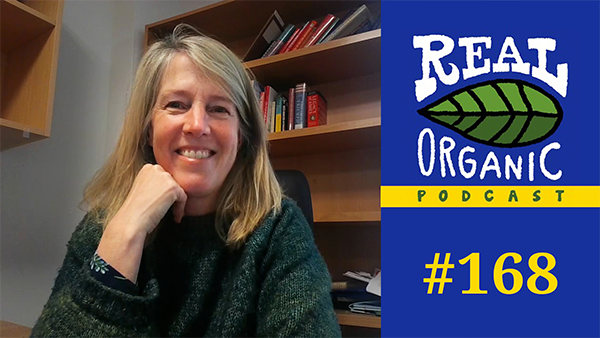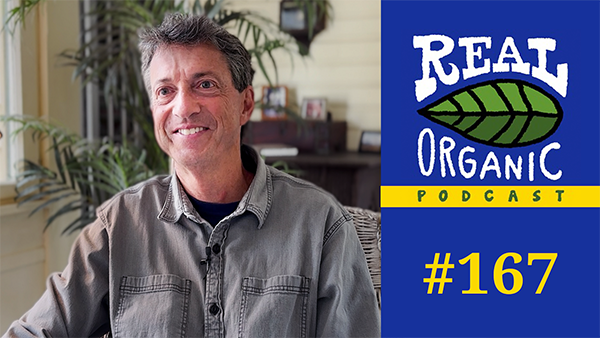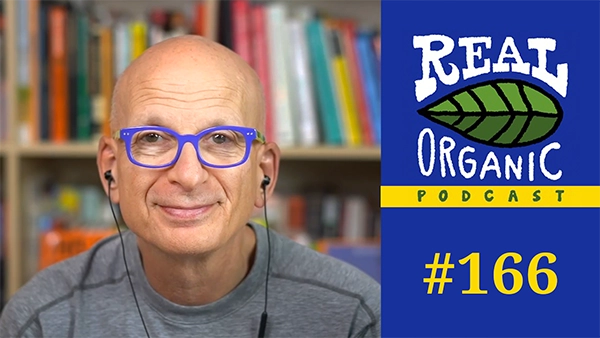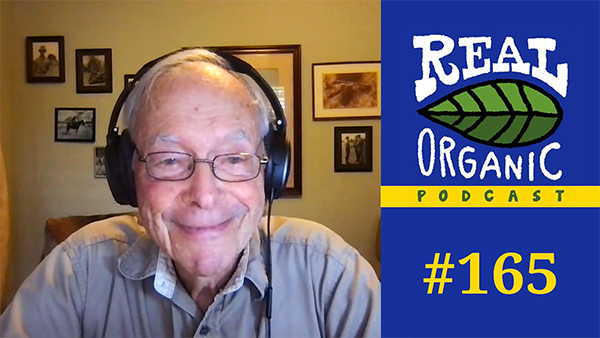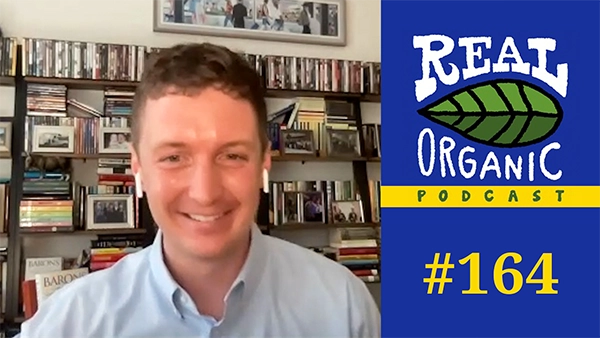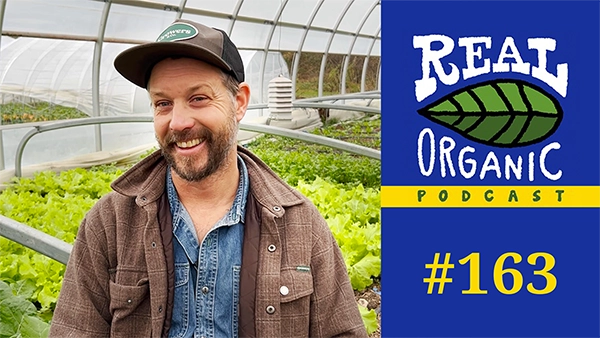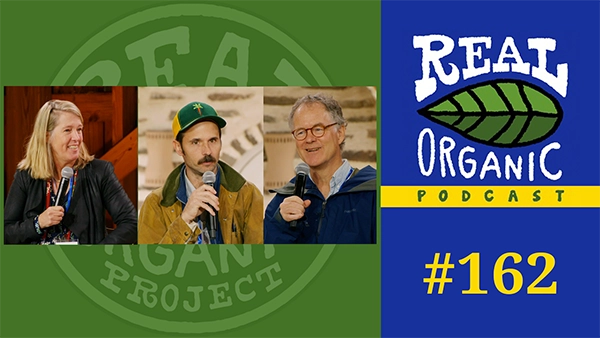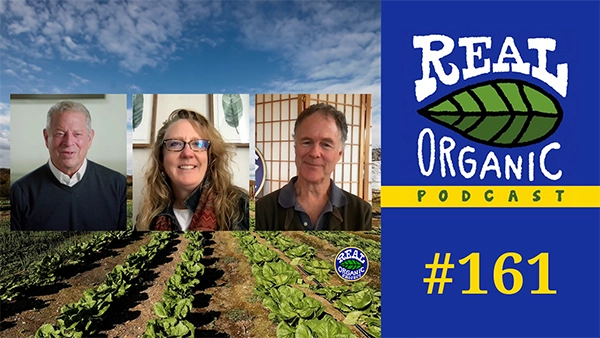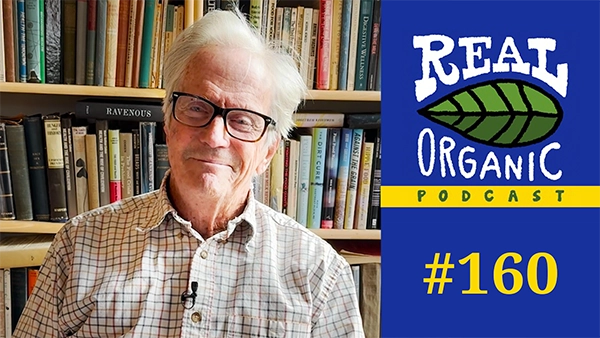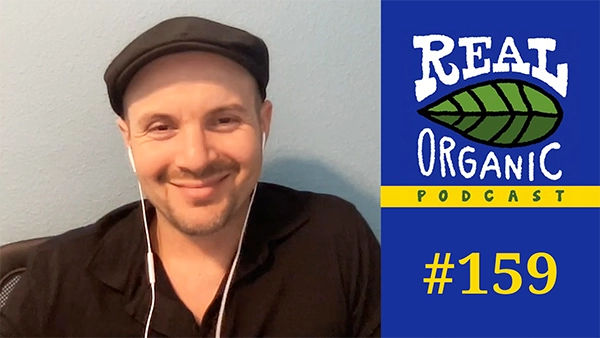Episode #011
Seth Godin: The Powerful Story of the Organic Movement Tempts Big Ag
Welcome! You can subscribe and download episodes of our show through your favorite podcast app.
You can also subscribe to receive the video version of each episode on our YouTube channel.
Our Seth Godin interview has been edited and condensed for clarity.
Dave Chapman: Welcome to the Real Organic Podcast. I am very pleased today to be talking with Seth Godin. Seth is a longtime teacher of mine who I’m just meeting for the first time today. I have read many books by Seth, I’ve listened to many podcasts of Seth, and I’ve taken the altMBA, which is one of his numerous online educational courses. Very intensive and, and you know, really productive for me.
So Seth, you’ve written many books, you’ve given many talks. I wonder if you would just, because we’re going to be talking to a lot of people who don’t know you yet, I wonder if you would just take us for a spin around the block and give some sense of your thinking, of what it is in these many books that you’ve written. And much of the educational work you do – kind of, what’s the essence of your message?
Seth Godin: We’ve all been indoctrinated. We’ve been indoctrinated into a system that’s built around industrialism and caste. That’s built around scarcity. That’s built around doing what you’re told, fitting in, treating other people maybe as more than you, or as less than you.
And none of that has to be the way it is. And what I’ve been trying to do ever since I wrote Permission Marketing, which is about stealing people’s attention, is helping people see that we can pick ourselves.
We can model a different approach to culture and we can do work we’re proud of for people we care about. And that once you begin to see the degrees of freedom that you have, it starts to feel more like a responsibility and you have leverage to make a real change in the world. That is the arc of what I’m trying to help people see.
Dave Chapman: Yes, thank you. I’ve personally been very inspired by it and it’s been powerful. I was really struck in the altMBA at the power of the tools that we were learning.
I am a farmer and I am part of the Real Organic Project that is trying to represent farmers and present a way of farming that people want, but that they’re often misled about. I’m curious what you would say about farmers as a group tending to be pretty bad at marketing, and tending to be a bit adverse to social media and the other tools that are accessible.
They’re awfully good at growing food. And they’re often competing with very large agricultural enterprises that are very good at marketing and I would say, not as good at growing food. You have any thoughts about that?
Seth Godin: We have to take a minute to look at the words you’re using. Farmers are actually really, really good at marketing. What they’re bad at is spin and hype and advertising, but that’s not what marketing is. If you ask the typical person, do you trust your local small farmer to do the right thing? Almost all of them will say, “yes, it’s one of the most trusted professions.”
that’s marketing. If you say to somebody, “would you rather have an ear corn from the farmer’s market?” – notice it’s called the farmer’s market – or “would you rather have an ear of corn from ConAgra?” Most people would pick the farmer’s market.
What’s missing is a mindset of practical empathy to realize that if people don’t know what you know, they might not want what you want. They don’t see what you see. And as a result, if you’re not willing to go to where they are, because people are lazy and shortsighted, they will not come to where you are.
And I spend a fair amount of time with people in the food chain. And I know a bunch of farmers here in New York and I’m amazed at the little things they get, right? And the little things they don’t, in terms of the story they tell about the food that they create and how hard they work. Right?
So there’s one big market at the Union Square Green Market. One farmer has a white tarp over their stand and another one has a black tarp and all the food under the black tarp just doesn’t look as appetizing as this stuff under the white tarp. It’s a marketing choice, right? I’m sure there was a good, practical reason to buy a black tarp, but it wasn’t made with the person who was going to buy the food in mind.
And so we get these choices that we make. And when we look at populations, people make choices sometimes in predictable ways, which is how we end up with tater tots and how we end up with a food that’s over-processed and over salty, because it touched someone’s short-term needs, as opposed to telling them a story that they could live with for the long haul.
Dave Chapman: Okay. So let’s talk about telling stories, because I know that that’s very important. In your understanding, what does that mean to somebody who is not experienced in this way of thinking?
Seth Godin: So story has not a lot to do with “once upon a time” but everything to do with the basic human technology of how we process our understanding of the world. So most city dwellers, not most – many city dwellers, believe that on the first beautiful day of spring the crops are ready because they don’t understand the story.
They haven’t lived with the story of where that food actually comes from. And they’re not that interested in the story, or else they would know. So they show up on the first farmer’s market of the year, demanding to know where the blueberries are. Well, it might be beautiful outside, but the blueberries don’t know that.
But if the only story you’re going to respond to them with is “you’re an idiot” then there is something broken in the chain. All they know is that there are blueberries at the supermarket. And that’s a different story.
That’s a story of convenience and demand and packaging, right? So what we need to do, if we’re going to change the food chain, is begin by changing the story that people tell themselves about what it is that they’re consuming and why. And you, I’m sure, have met that person who shows up at the farmer’s market and asks the 18th question about, “well, did you rotate through the xyz? Oh, I can’t eat that then.” And on their way out, you see them eating a Snickers bar because the story they tell themselves is that they want control.
And that’s why they’re gluten-free. Or that’s why they only eat foods that start with the letter T; that’s a story, control. They don’t have words for it, but they’re living it. And so the magic sorted by accident is that organic came along with a really powerful story that resonated with a lot of people, for a whole bunch of different reasons, but people like you and other farmers who worked so hard to meet the stringent regulations, get hung up on the engineering of it as opposed to thinking deeply about the story of it.
And that’s what people are buying. The typical person cannot tell the difference; their body eating one 10th more or one 10th less organic food will not react differently, but their brain? That story super powerful. It’s why it was worth going to work today, so they could make enough money to buy that peach for 15 cents extra. Because the story they told themselves about nurturing and mattering and sustenance was worth way more than 15 cents.
Dave Chapman: Okay. So what’s the story that you tell yourself when you buy food? What are the things that you care about?
Seth Godin: So I personally, because my professional life involves playing with ideas that are outside of my control, I’m really controlling about the food that I eat. And I almost entirely cook for myself. I haven’t had meat in 35 years. I don’t eat gluten because it’s bad for my shoulders and on and on.
I’ve all these rules and I never bend them. I don’t go anywhere near them because I picked them myself. I like these rules. And when I go to the farmer’s market, and I’ll drive my electric car, 30 miles to get there, I tell myself a story about sustainable agriculture, about knowing the farmer, knowing the farmer by name, knowing the farmer’s family, understanding the difference between this kind of pepper and that kind of pepper. All of these things inform something in me because I’m not sure I want to live in a city.
And this makes my story about where I live easier for me, because I’m part of something. And then when I go to the supermarket, I tell myself a story that I’m a little smarter than a lot of people, because I understand the tricks that the marketers are playing on us, but I still fall for them. Not every time, but I do.
And so I am intellectually involved in the story of food, but I also grew up with an amazing mom and dad. And my mom cooked for us and took us to the farm stand. So a lot of my engagement with food reminds me of her. And that’s another part of this thing; it’s not just to live, I mostly live to eat.
Dave Chapman: Yeah, I know that you put a lot of attention into cooking a good thing. I appreciate that. So, okay, one of the things that I’ve seen – and we’ll talk about having a microphone in a minute – but one of the things I’ve seen is that there is almost two paradigms colliding right now in America, in our food system.
There’s a small local food system and it’s growing. We actually have more farmers in America now than we had 10 years ago, which is amazing. And that’s all those small farmers who are going to the farmer’s markets and some of them are selling to supermarkets, but a lot of them are selling direct or to their CSA.
At the same time in the Midwest, there are fewer farmers. There it’s the same amount of farmland, but the farms are getting bigger and bigger and they’re selling to bigger and bigger processors, they are then being distributed by fewer and fewer distributors to fewer and fewer owners of supermarket chains. And I see this constant consolidation and silo-like effect. And so I see this very different from what you’re talking about; about the democratization of the economy. And it’s quite the opposite as soon as you step into that supermarket arena.
Seth Godin: Oh, it’s both. Yeah. I mean, let’s be clear. You’re not competing with ConAgra, except for maybe share of stomach or share of wallet, but you’re competing with ConAgra as much as you’re competing with Netflix, right?
That somebody who has a certain amount of disposable income after they’ve eaten enough says to themselves, “Oh, will I spend $20 on Netflix? or will I spend $20 on peaches?” It’s not like that.
Real farmers grow to stay alive, not in the economy that I live in. They eat it [good food] because the story is worth the hassle, the time and the money, but it’s not an alternative to industrialized factory farming. And I think it’s inconceivable that the local small time farmer is going to make a significant dent in what we’re seeing in the Heartland, the churning out of huge amounts of food that is unrecognizable to most farmers, because that’s what industry does. Industry continues to expand until it can’t expand anymore.
And so what I say is give it to them that you can’t take it. You can’t slow them down, all you can do is understand that the smallest viable audience is enough. If I think about a farmer with a CSA, how many families do you need? 500, a thousand, 2000? Not that many.. out of 300 million people in America.
So yeah, industrial farming is a real problem. It’s a problem for atmospheric cancer and global warming. It’s a problem for fossil fuels. It’s a problem for supply chain, a problem for resilience, all those things. But the hard working farmer who has 50 acres isn’t going to solve that problem. It’s going to be solved by organized intervention at the government level, and that’s not going to happen anytime soon. On the other hand, it is possible to become a resilient grower of food, doing work.
You’re proud of your customers who care about you without worrying about ConAgra, without worrying about the giant corporation, you just need to find your 5,000 families, your 10,000 families who will support you through thick and thin. You are doing something for them. Many of them have higher incomes, but not all of them.
All of them are seeking a story. And the mistake that farmers who see this problem fall into sometimes, is they say, “how can I get two zeroes bigger and heal the world?” But as soon as you do that, you’re playing their game and they’re better at their game than you are.
Dave Chapman: Okay. I want to go there, but first, I just want to clarify “story,” because people hear that and it can be, it can be triggering even. So you’re talking about story is actually something that’s very positive, and something that we need. We need to make stories in order to understand. Have I got that, right?
Seth Godin: Yeah, let’s be clear. The word organic is a story and it means different things to different people. It meant something different before the government decided what organic was. A lot of the farmers that I know have chosen not to have that label on their food anymore because it carried other things with it they didn’t want, and they call themselves something else.
It’s a word, right? It’s a word with seven letters in it, but it means something to different people in a different way. It’s a story. And it was interesting when you saw Walmart and others rush after that word. Well, the industrial farmers decided they could use that story as a weapon to grow a little bit more, right?
And you’ll also see people who aren’t Jewish going to the store and buying food that’s kosher. Cause they’re telling themselves a different story about the word kosher than somebody else might tell themselves.
But story is simply how our neurons align around an idea to take us from where we are to where we want to go. And we don’t know the truth of anything. We don’t know the truth of anyone, right? So if I say, who is Richard Nixon? And you say “he was a crook,” well, there you go. One word, that’s his story. But maybe he was a good dad. I have no idea, not part of his story for me.
So what is the story of your farm for the banker, for the store owner, for the housekeeper or the person who’s making a meal that you can tell in 10 words, 20 words, a hundred words? And a picture, because that story is what we’re going to remember. If you don’t have a story you’re invisible.
Dave Chapman: Okay, so you bring up something which is again, an interesting collision between the local personal and the state or national or international level. And I just interviewed Bill McKibben yesterday. So perfect example of somebody who started very locally.
So he said his first rally was a thousand people walking down the road in Vermont. And of course it grew in six years into the biggest protest in world history. And some of the problems that you talked about, like Climate Change, we can only deal with on a huge governmental level. Ultimately, it was Al Gore who said, “you know it’s great to change the light bulbs, but we need to change the laws.”
So my question is, how do you see what you’re talking about with story? Cause I see a connection. I’m curious what you see about the connection between what Long Wind Farm does and the story that we tell and what Real Organic Project does and the story we tell and changing that system that you said we can’t change that’s unchangeable. And that we also say, we must change if our children and grandchildren are going thrive.
Seth Godin: So I need to clarify, I didn’t say the system cannot be changed. I said, the system cannot be changed just by some organic farmers. That where cultural change always happens is with one sentence, which is “people like us do things like this.” Once it’s established who people like us are and once it’s established, what things like this are, then in our neighborhood, in our circle, in our culture, eventually in our country, the world changes. Because our expectation for what it means to be “us” changes.
And so if there wasn’t a way for consumers to get an alternative to industrialized food, there would be no movement to move away from industrialized food because the alternative would be starving to death. So when a farmer shows up and says, “wait, it’s possible with the CSA, with putting food aside, with doing this, to really shift the way you are living” then it becomes possible.
Then the question is when Bobby comes over to have a play date at his friend’s house, what does Bobby’s family learn about what happened during that play date? Right? “Oh, we’re the kind of family that doesn’t serve chips afters school.” We had this, you know, wonderful snack of apples or whatever. Suddenly culturally it begins to change just in a little pocket, maybe just in Berkeley, but you know..
Alice Waters by herself did not defeat McDonald’s. But Alice Waters taught someone who taught someone who taught someone and taught someone. At the same time, McDonald’s continues to grow, but there is now a significant alternative in public schools and in high end restaurants and everywhere in between, because one woman said, “let me teach you what I know.” Let me tell you a story.
And my friend Will Rosenzweig who teaches at UC Berkeley of course on the Business of Food. And he and I did a workshop together leading that storytelling cycle. The problem is you still gotta make the harvest. He’s still got to deal with the rain and the fires and everything else.
And as you said at the beginning, you don’t want to be a marketer. Totally get that. So there’s this whole complicated ecosystem, there’s this complicated ecosystem and you are a part of changing the story. But you’ve got to see what the story is because it is not simply about how do I get a peach onto that table.
Dave Chapman: And that story has to touch the consumer. That that’s what you mean by “you must see in order to be seen.”
Seth Godin: Yes. Yes. So what I’m saying here is, if someone comes over to my house and I feed them a meal, am I telling them anything? Before I open my mouth, just by showing them I didn’t order-in pizza, this while I’m telling them a story of “taking care.” Say I have a limited amount of time on my clock and I decided to spend a lot of it on you. That’s a story.
And then if I say, “of course there’s no tuna here because I’m not going to make an animal extinct by eating their meat,” saying that begins to spread a story. When I say I bought this from Dave’s organic farm, and I tell a story about Dave, I’m telling a story.
All of these things pile up in terms of expectation. Am I bragging? Well at some level I am because I’ve invested a lot of time and effort into knowing about where my food is coming from. Am I sharing and raising the esteem of other people? I believe I am because that’s.. you know, every religion that’s ever spread is spread because people eat together. And so that’s another part of the meta of story. And I’m saying we just can’t be a technocrats about it. We have to realize story is what changes human beings.
Dave Chapman: Okay, so Seth, one of the things that is a very familiar idea coming from you is that we all have a microphone. And I’m very fond of that image. And one of the things that I tell farmers is, “you know, you actually have a louder microphone than most citizens because you’re a farmer; people care what you think.” Could you talk about that idea that in this age, in the information age, everybody has a microphone?
Seth Godin: Yeah. So when I started, there were three business magazines: Forbes, Business Week, and Inc. And I’m fortunate in that if I didn’t get picked by one of them, no one would ever hear anything I had to say. And now there’s a million business magazines, maybe more, and anybody who has something they want to say can be heard by 10 people. Then what happens, right? Do those 10 people tell other people?
So I did some work with Western Seed in Kenya. Kenya has a bread belt in the center of it, where they grow an enormous amount of food. And about 40% of the farms use farm saved seeds. And you and I both know that farm saved seeds are a romantic idea, but they don’t work as well as hybridized, thoughtful seed development because fresh seeds that are optimized for the climate can pay for themselves many, many times over. In the case of Kenya, the Western Seed corporation, selling seeds for $20 that generated $2,000 per acre of incremental profit.
And if you’re a farmer in Kenya, $2,000 is enough to put all your kids through private school. It totally changes everything in your life. So why was it that almost 40% of the farmers didn’t plant Western Seed? That was my mission. I went there to help Western Seed with this problem and what I learned, which no one had figured out I was amazed, is that in Iowa and Nebraska, every farmer knows what every other farmer’s planting. They know it to the penny, to the acre, to the yield.
And in Kenya, no one ever talked about it. And the reason you didn’t talk about it was if you were doing much better than your neighbor, then your neighbor would ask you for something and you would have to give it to them because that was built into the culture. And so people torn between a communitarian mindset and the capitalist mindset were eager to grow more food, but weren’t eager to talk about it.
And so what I helped Western’s team to understand is that their real job isn’t to make a seed that’s 5% better. It’s already good enough. Their real job is create a community where farmers talk to each other about CGM, because if that was happening, then the number of farmers who would plant their seed would double.
And that’s an example of how we show up with something that doesn’t feel like a microphone that is a microphone, that the goal is not to have a bunch of Twitter followers. They don’t do any good at all. It’s to say, “there are people who are listening to me, what story will I tell them that they will tell other people?” They won’t tell other people because it’s important to me, the farmer, they will tell other people because it’s important to them. And that’s when the shift happened.
Dave Chapman: Okay. So a little bit in connection to that, I heard an interview that you did with Scott Omelianuk and I’m not sure if I pronounce his name right. It was very interesting, on one of your podcasts, and he asked you a question and it resonated for me. Cause I’d just said the same thing the day before in the altMBA. And he said, “what is something important that you’ve learned in the last five years?” Do you remember that?
Seth Godin: I don’t, but if you prompt me, I’ll try.
Dave Chapman: You said “I had much greater faith in the democratizing effect of the internet.” Yeah.
Seth Godin: Yeah. I really thought that if we gave freely people a chance to speak up, they would use it to lead and to connect and to create thriving culture. I didn’t realize how motivated the trolls would be, how selfish and short-sighted people would be. And mostly how manipulative the social media networks would be.
You know, I’ve been doing this since 1976. I was on bulletin boards in the eighties that were a very special place because trolls weren’t tolerated and people weren’t treating it like a bloodsport. They were showing up truly trying to weave together possibility, to make things better. And you can find examples of this now all over.
If you go to a site about, you know, apples, you will find apple farmers freely trading information to help each other get better. And I really thought we could do this in the large. And I underestimated how brutal politics could become, particularly when it gets weaponized by money. And and it really makes me worry. And I think it’s on both the social networks and our government to say, “yeah, we don’t have to have that kind of discourse in order to make ourselves better.” Same way you don’t yell fire in a movie house. It’s not okay to tear down the things that we built our world on.
Dave Chapman: I had a related concern when I was in the altMBA. I was really struck by the sheer power of what we were learning, that this really made us more effective at communicating and engaging at building community. And I used the Real Organic Project as my subject for almost every assignment. Cause I’m pretty busy, so I thought perfect.
And one of the things I was struck at the end as I reflected is that to some degree, many of these things I was learning were ethically neutral and it could be used just as effectively by the bad guys. Yup. Do you have any thoughts about that? It’s just fascinating. It’s just exactly what you said, that you thought that this was going to be such a positive thing. And it has been. You know, yesterday Bill McKibben said, “I don’t think we could have built 350.org today the way we did 10 years ago, because 10 years ago, the internet was more naive. It was younger. And so we were able to make such an effect and connect so easily. Yeah.
Seth Godin: It’s this dilemma I have, you know? Like if I get hired to give a speech to a cigarette company, I won’t go. Cause I think highly enough of my work that I don’t want to help them do better. On the other hand, I can’t vet every single person who buys one of my books or reads something about how to look at the world. So what we try to do is model behavior.
And I think you found inside the altMBA, we do that very rigorously. But yeah, I mean, I’m appalled that people read my book Tribes and turned it into a weapon for fascism. Appalled. And maybe if I had a chance to not write the book, I wouldn’t even write it. But I feel like if I can keep showing up with enough examples and applaud the work of enough people, maybe we can make the culture better because the fact is, we’ve been here for a million years and the world is safer and healthier than it has ever been in history, including all the people who have gotten sick and ill in the last bunch of months.
So the media has persuaded us that the world is really, really in big trouble and persuaded us to also feel helpless at the same time. And I don’t think we’re helpless. I think we have time to change our government. I think we have time to change the way we interact with each other. And I don’t know what else to do, but try.
Dave Chapman: Thank you. I just think it’s important for us to keep our eye on that and remember that. Thank you. So let me ask you something a little less political, a little more fun. I am a long time fan of Eli Goldratt and the Theory of Constraints and The Goal transformed our farm many years ago. And we still use it constantly. It’s a perfect example of what I mean by thinking well.
It’s so marvelous at focusing your attention on something that’s important. I got the book as part of the altMBA beautiful constraint. I’m curious if you think that… actually one of the problems I’ve seen with Eli Goldratt’s tool is it is ethically neutral. And so he accepts that the purpose of a public health corporation is to make money. And, you know, I actually think it’s more complicated than that. I understand it’s the legal responsibility to make money for the shareholders, but it’s not, that’s…
Seth Godin: A myth. That’s not true. I just have to interrupt you there. Keep going with your question. That’s Milton Friedman’s fault. What you just said is not true. There is no legal responsibility of a corporation to make as much money as they can. It doesn’t say that, anyway.
Dave Chapman: Well, let’s go with that then for a minute. You know, that’s my question is, you know, I think that in the end, even the biggest corporation is composed of human beings and they themselves are complicated and they have a part that does not want to do sell cigarettes to people to make them sick and die. And some part is willing to, so let’s say it’s complicated, but do you think that.. there are things I know you’re familiar with, the Theory of Constraints.. do you think there are things that are important that got left out? Or do you think that there’s a next step to that?
Seth Godin: Okay. So for those of us who are listening at home, the Theory of Constraints basically says it is tempting to complain or worry or challenge every constraint in your life. But in fact, if there are no constraints, we can’t do productive work. That constraints are the lever that we get to use to lean against, to do our work.
And so, yes, if every acre of farmland was perfectly fertile and the weather was perfect every day, we would grow a lot more food. But if we grew a lot more food, so would everybody else. And so the amount of money you would make from growing the food wouldn’t be any bigger than it is today. So when you look at the constraints, whatever they are, you say, “Oh, I have this constraint. Other people have this constraint, what will I do with it?”
And what we challenge people to do is not ignore constraints or pretend they don’t matter, but to embrace them and to celebrate them because only by seeing them, can we use them to our advantage. But the second half of what you’re saying, Milton Friedman wrote a story for Newsweek in the early seventies that was embraced immediately by industrialists. That said, the only responsibility you have is to maximize shareholder value.
That was not true at the time. It’s not true now. And what it says for a corporation is simple. You are a legal entity and you make a contract with the other entities that you work with. And if a shareholder wants to buy shares, they can buy shares. If they want to sell shares, they can sell shares. So if Patagonia wants to be more ethical than some other sports companies, don’t own shares in Patagonia. It’s up to you, but Patagonia is not being breaking any law or principle by not maximizing short-term profit.
And some people come along and say, “yeah, but it’s even better than that.” Because by being ethical, Patagonia maximized its long-term profit, which may or not be true. But I don’t care. I don’t think that’s a good reason to be ethical. I think the reason to be ethical is because you’re a human being and you live on this planet period. That’s all. So if you have the resources to make things better and you can afford it, please do. And I don’t care if you’re maximizing your profits. That’s not your job. Your job, the short version is, I don’t believe culture exists to enable capitalism. I think capitalism exists to enable culture.
Dave Chapman: John Ikerd suggested that Adam Smith would agree with that statement.
Seth Godin: I think so, too. Yeah.
Dave Chapman: But when it began as an ideological way of understanding our economy, it was intended always to be for the common good. And if it’s not fulfilling that, it’s not fulfilling its basic mission.
Seth Godin: Yeah, absolutely correct.
Dave Chapman: Okay, so you imagine a very different kind of economy. And I think what you would say is that the transition from the industrial age to the information age, which is that my concern is no longer whether I’m going to write something that will be on the bestseller list. And partly the bestseller list is kind of silly now, even if it wasn’t before, because there are now – well, the number one bestseller now wouldn’t have made the top 50, you know, 50 years ago. That everything is more, more spread out. Is that, did I get that?
Seth Godin: Well, you got part of it. Right? But let’s get this back to the life of a typical farmer. Okay. I’ve read that on farms food breakage is 20 to 40% depending on what you’re making and how you’re making it. I think it’s probably higher than that because there’s plenty of food that doesn’t even get further enough along for it to count as broken.
There’s a real challenge between what you plant when you plant it and when someone buys it and what they pay for it, this is not a farming problem. This is an information problem. And over time we come up with interesting ways to solve information problems. Cause the economy shifts from how do we get more oranges per acre to what’s the most efficient way to get oranges to people who want oranges. It’s a totally different question. And so when I think about what do we mean when we talk about the Connection Economy?
Let’s think about if it hadn’t been run as the criminal enterprise, what Uber invented, right? So Uber figured out that information about cars is worth more than cars. That knowing who’s got a car where the car is and who needs a car is worth more than owning the car itself. That’s a really big insight. And it turns out to be true that figuring out how to work with trust and attention so that I get the car I need when I need it.
If the pandemic hadn’t happened and they hadn’t been a criminal enterprise, the whole world would be transformed by this idea. And then one step further; once we teach cars how to drive themselves, well, then what you get to do is you buy a car and it works for you all day long instead of sitting in your garage, picking people up. And then at night it comes home and gives you it’s money. Right?
So all these things start to get really fascinating when we understand that connection is valuable. So for me, one model of somebody who wants to make a living doing this is, how do I sell 4 million books to strangers? Because if I make 40 cents a copy in royalties, through the math, my model is, are there 10,000 people on earth who trust me enough to back my next project? Because I don’t need 4 million. I just need 10,000. That’s plenty because if I can offer them something that they maybe or maybe not tell their friends about, my publisher’s happy, I’m happy and I haven’t compromised anything.
And so the smallest viable audience is different than racing for the short head. Now you said about evenly distributed at the very same time, the long tail has come. The hits are bigger than ever. That we still want there to be one Beyonce because you know, if you’re gonna play a song at a wedding, if you play Beyonce, you’re probably gonna do, okay.
So if you make a hit like Malcolm Gladwell’s books, they sell between 10 and 20 times as many copies as mine, that’s fine with me because Malcolm figured out that he would be a hit and the audience wants him to be a hit. Because if you read Malcolm, you can say, “I read a business book this year.” Fine. I don’t want that.
And I’ve written 7,000 blog posts. Not one of them has been the post everyone talked about. Absolutely great. Because once that happens, then you want to chase it again. And then you’re back to being Heinz, not being the kind of farmer you want to be.
Dave Chapman: Yes. So is the Connection Economy only possible in the Age of the Internet? I’m just curious because you know, it’s occurred to me that one of the things I’ve done as a farmer is I’ve just copied a lot of Dutch technology and Dutch thinking because they’re obsessive and driven as a culture. And I go, “well, I’ll just take some of their things that they have spent years refining.” And it’s very powerful. It’s very effective. I’m just curious, the things you’re talking about, could you have done the same things 30 years ago?
Seth Godin: The only thing you could have done 300 years ago is what I’m talking about. So 300 years ago, all there was, was the village. And if you couldn’t find enough people in the village to buy your apples, you’re out of luck. And then we had this big, weird industrial interregnum where there was this push for anonymous mass markets and all of the writing and thinking from 1925 to 1985, 60 years is nothing but anonymous mass markets.
And so during that period of time, there wasn’t room to, you know.. Star Trek was the most interesting TV show. In the 1960s, you had to beat Gilligan’s Island to win. You could go for the largest number of people you could. But what happened first, you go to cable, then you go to the internet, then you go to satellite radio. Then you go to blogs. All of these things are fractionalization of anonymous mass.
You go from every supermarket A&P to, oh, there’s a Whole Foods where their organic cosmetic department is as big as the A&Pp used to be. Right? So you have more fractionalization and fractionalization is amplified by search. It’s amplified by the internet, by Google.
Last time I checked it said that one quarter of all the searches done on Google had never been done before. Every day, 25% of the things people are typing in, no one in the history of mankind has ever typed in before. Because when you give people a choice, they take a choice. And that combined with the free interaction between and among people who are interested, not spam, not people calling you at home night during dinner on the phone, but actual engaged permission, that changed things at scale.
So we go back to a village mindset. And I like villages. I live in a village and villages are way more resilient than nation States because villages have this notion of, there are no strangers here. And there’s a sense of self sufficiency that requires acting in a longer haul because people in a village who act in the short run get shamed by their neighbors.
Dave Chapman: Yeah, yeah. I heard a story once of somebody in Maine who got this smart idea. And instead of going out onto the beach and digging the clams, they took a tractor and a disc harrow. And so they turned up all the clams and harvested them all. But by the time they got home, their house had been burned down. So you know, it was a very quick punishment for a violation of the Rule of the Commons. Yeah. Yeah.
Seth Godin: My wife asked me yesterday, “how come people don’t steal lobsters from everyone else’s lobster traps?” I said, cause you only do that once. Yeah.
Dave Chapman: Have you seen the the Social Dilemma on Netflix yet, by any chance?
Seth Godin: It was recommended to me. I’m afraid I wouldn’t sleep for a month after seeing it. I’ve been feeling it in my bones for a long time. I don’t use Facebook, Twitter, LinkedIn, any of them, because I don’t want to be their product. I don’t want to be the thing they sell to other people.
Dave Chapman: Yeah. Yeah. It is disturbing very disturbing, but it is worth watching if you can sleep, because it’s very revealing. And there’s so many people who are the, the engineers who started all this and they’re saying we really were trying to do something good and it really hasn’t turned out well.
So, you take joy in the art of marketing. And so do I. Some people with great products are lousy marketers and some people who are very good at marketing make really lousy products and are not our friends. I think it’s really one of the things that has driven the creation of the Real Organic Project with so much run up against big multinational corporations who somehow got elbowed into the picture. And you know, we go, “no, we’re really not with them,” but there they are. And, and they’re actually better at it than us. I’ve seen people who are so much better at looking like us than we are.
Seth Godin: And that’s why the direct connection is so important because they can put something on their label. They can put something on their box, but you’re the one that has my ear. And if you don’t blow it, I will listen to you. The problem is, when short term urgencies show up, sometimes you misuse the attention and then I stop listening to you. And taking people on that journey takes a lot of discipline. So with that said, thank you. I’m just such a fan of the work you’re doing and the people who are listening to this, it truly matters.



